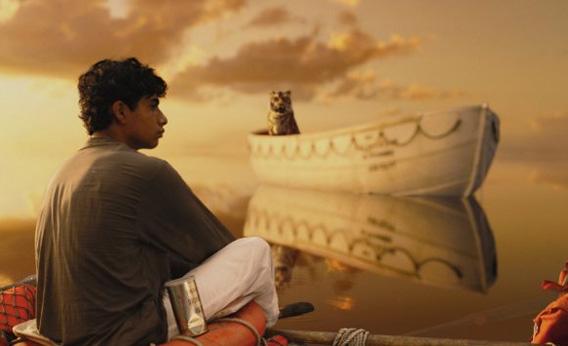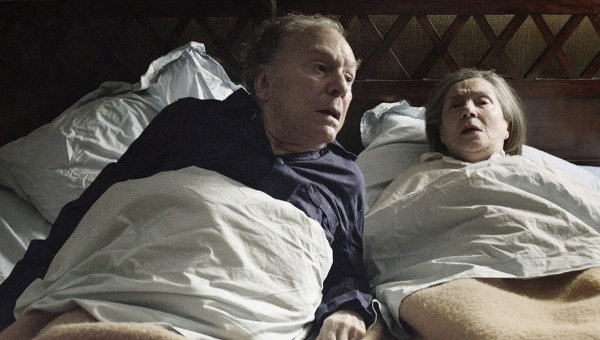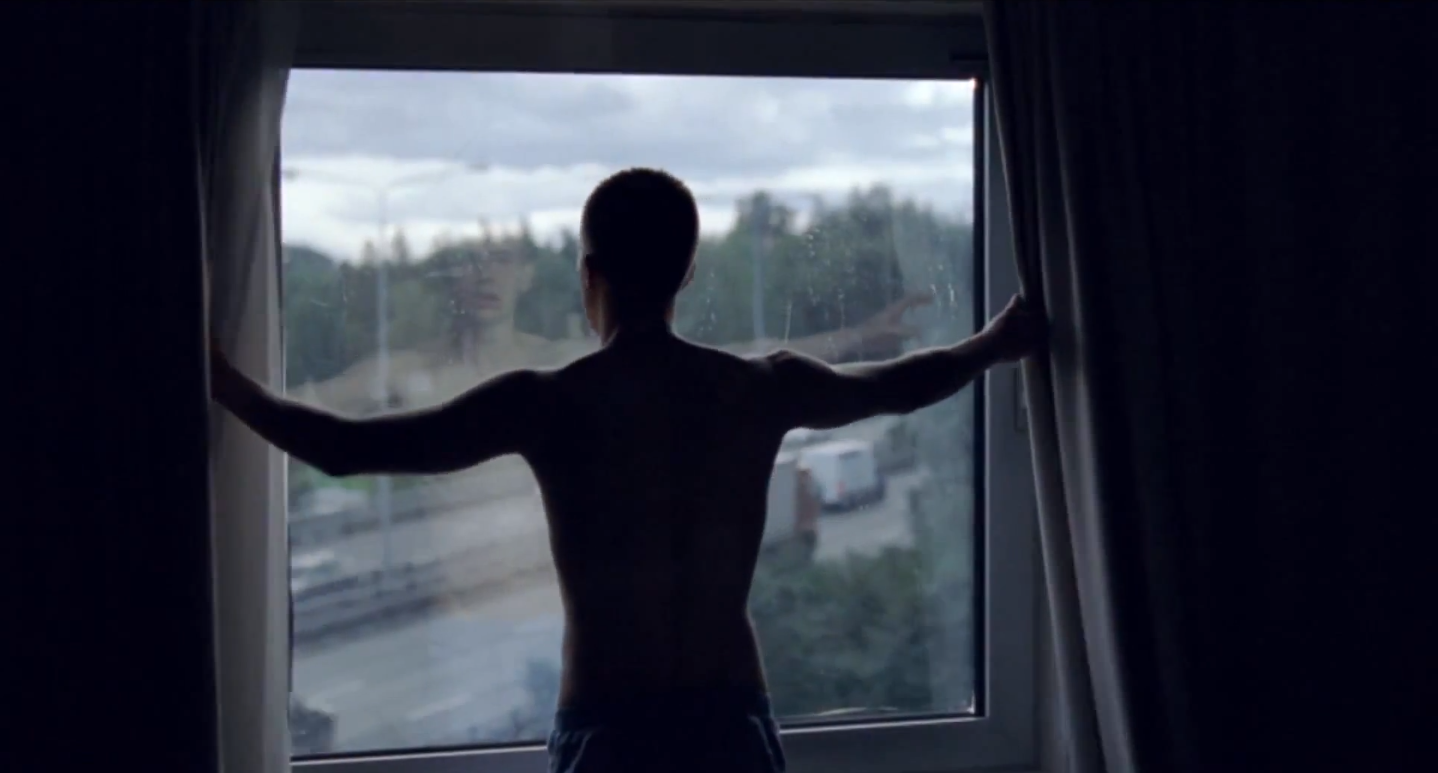With the Academy Awards tomorrow, the season of 2012 retrospection comes to close, so in that spirit (and just under the wire), I present my world cinema favorites of the year. Standard blog rules apply: a film is eligible if it came out in American
theaters or if I saw it at a festival, and I'll do a top 12 to cheat
and fit more in. The only big contender this year I haven't seen is
Django Unchained, which is not included, but acknowledged in absentia.
So what defined 2012? It's a fun game of gestalt, spotting patterns between films where none were intended. Last year, I said that it was a year for the totally bizarre and paradoxical. 2012 certainly had its share of oddities as well—this is, after all, the year when Channing Tatum's abs and Robert Pattinson's prostate became metaphors for the American economy—but what stands out to me most is how so many prominent films this year have been about fiction: that is, art, stories, and the role they play in our lives.
Moonrise Kingdom,
Holy Motors,
Tabu,
Life of Pi,
In Another Country,
Cloud Atlas, and the Golden Bear winner
Caesar Must Die all fit into this in one way or another. It was also a year for the veterans of American independent cinema: Wes Anderson and Steven Soderbergh did some of their best work; Quentin Tarantino had his biggest box office hit; Richard Linklater held his own; Whit Stillman came out of retirement (the movie wasn't very good, but I'll love him just for that); and P.T. Anderson, for whatever it's worth to you, made
The Master. All we're missing are Todd Haynes and the Coens.
Onward:
12.
Life of Pi (Ang Lee, USA)
Some critics have accused this of pandering and proselytizing, and if I agreed, I might be annoyed too. But while you can walk out with an inspirational message about faith if that's what you're looking for, I see it as a much more conflicted movie about the only way a man can find of coping with horror. So what may have looked like pandering might actually be empathy—besides, if it were proselytizing, it would be much more pushy, which is a word no one has ever used to describe Ang Lee. And under his direction, with some of the best photography of the year, the film unfolds like a beautiful picture book.
11.
Footnote (Joseph Cedar, Israel)
It's been obscured now by more publicized films, but this satire of academia, Judaica, and family strife was one of the best films to slip quietly into arthouses in the first half of 2012. It's a comedy, yes, but on a larger level, it's also an acrid story of animosity being passed down through the generations and conflicts that remain intractable when both sides refuse to talk. And it has the guts not to provide a resolution.
10.
Lincoln (Steven Spielberg, USA)
People I know (myself included) expected this to be bad, and why not? The trailer looked like an Oscar-bait parody—Daniel Day-Lewis was acting really damn hard, and if the music were stolen from last year's
War Horse, we wouldn't have been able to tell the difference. But always check the credits. The script by Tony Kushner, full of irony and cheerful cynicism, doesn't cancel out the expected Spielberg vibe; instead, they augment each other in surprising ways. And so after we see one of America's most beloved presidents resort to such underhanded, questionable tactics, we close on a speech of his lofty ideals. The result is a movie that's hopeful without being naive, optimistic without being safe. The concerns about historicity and ethnocentricity are entirely valid. But this still may be the most morally complex film Spielberg ever made, and the first genuinely provocative political movie to take the Oscar stage in quite some time.
9.
Amour (Michael Haneke, Austria)
I
never thought I'd have to go to bat for Michael Haneke, but as his
latest film won him a second Palme d'Or, I was surprised at the number of
serious cinephiles who stepped forward and spoke out against him. It's
not that his critics think he lacks skill—on the contrary, even his detractors tend to agree that he has plenty. But they object to him on moral
grounds: the charge is that he's a sadist, an arrogant manipulator who punishes the
audience to "teach them a lesson." It's true his movies are by and large unpleasant viewing experiences,
and something like
Amour is unpleasant with a very specific and not at all subtle purpose. So on the one hand, some backlash is understandable.
Amour
not only won the Palme d'Or over a lot of more interesting films, but
nothing surprising happens in it, it lacks the ambiguity of Haneke's best
work, and when it wins Best Foreign Language Film tomorrow, it'll be
because it fits the Academy's platonic ideal of a "foreign film" (and
because the Academy is getting old themselves). But cinema history is
full of misanthropes, manipulators, provocateurs, and angry
preachers making didactic speeches about problems that can't possibly be
solved by movies. And I don't see why Michael Haneke is any guiltier
of aggressive audience-punishment than, say, the Jean-Luc Godard of
Week-End, or the Billy Wilder of
Ace in the Hole, or the Béla Tarr of
The Turin Horse, or the Lars von Trier of just about anything.
Yes, this certainly isn't the "warmer" Michael Haneke that early
reviews promised, but the wages of auteurism can be steep, and if it
were separated from such a controversial body of work,
Amour
might be more clearly accepted for what it is: not a masterpiece, but an
unflinchingly effective and well-acted two-hander about a topic that rarely gets attention in mainstream film. And if Haneke isn't the right man for empathy, that concern is steamrolled by Emmanuelle Riva and
Jean-Louis Trintignant, whose performances give it all the humanity it
needs. And the last 20 minutes are exactly what they need to be.
8.
The Master (Paul Thomas Anderson, USA)
This
is the one I labored the most over. Undeniably one of the most high-profile "art films" of the year, it was expected to be a masterpiece and has since been received with an effusive mix of praise,
anger, and confusion. The film is symbolic, yes, but of what? Here we have a
movie about the unreliability of leaders made by one of the most
hero-worshiped directors of the day. I remember seeing a video Q&A with P.T. Anderson from a special 70mm screening of
The Master,
where he came onstage after the film, apparently high and/or drunk, to
answer questions. As his cinephile fans (who must have waited in
line for hours) told him how profoundly they were moved by
Magnolia and
There Will Be Blood
and asked for answers about his most perplexing film to date,
he mumbled ambivalent, semi-coherent replies, and ended by
wholeheartedly recommending that everyone go see
Ted. If he was doing it on purpose, it may be the year's greatest act of filmmaker performance art, because
The Master
is ultimately something of a Rorschach blot: a Freudian stew full of implications
but with few explicit messages, and bursting with impeccable craft put in the
service of some truly odd decisions. Is it just an exercise, a kind of heavy arthouse jam session? Part of the reason
Boogie Nights is still
Anderson's most satisfying movie is that it's a young man's film, the
work of a prodigy seeing what he can do behind the camera. Part of
the issue with
The Master's reception may be that he's still tinkering (more than
ever), but isn't so young anymore. Personally, what I see in it, or
choose to see in it, is a stunning evocation of post-war America, a grand and bizarrely effective psychodrama of man vs. self, and one of the most formally daring films to
play in a multiplex in god knows how long. I'll take it.
7.
Oslo, August 31st (Joachim Trier, Norway)
A film about suicide and depression that drains the idea of any bullshit romanticism, which is exactly what's so tragic about it. The main character's final act—it comes as no surprise—isn't part of a larger metaphor about the meaningless of existence, etc., which is an issue I had with the film's cinematic predecessor, The Fire Within by Louis Malle. Instead, it very subtly and practically lays out the reasons why this man feels he has no better option. An intimate drama that's dark without being overbearing—in fact, parts of it are downright warm. And that's why it sticks with you.
6.
Magic Mike &
Haywire (Steven Soderbergh, USA)
There are reasons for calling this a double feature, and not just because it means I get to slip in
Haywire, a fun film that couldn't make it on its own. For starters, it's a playful coincidence that Soderbergh's stripper-with-a-heart-of-gold movie starred a man, while his action revenge flick starred a woman. But mainly, I take these two together because it shows that in a prolific career often defined by its eclecticism, Soderbergh has just recently hit a strange kind of stride. In the last five years, his films have shown a continuity of style and theme that is as unified as that of Howard Hawks or Jean Renoir. This is not to say Soderbergh is as good as them—I'm not entirely sure he wants to be. He's more of a "post-Hollywood" revisionist in the vein of 1970s Robert Altman. Since about 2008, he's cranked out a stream of deceptively brainy films that toy with genre conventions and capture a digital snapshot of recession-era America. The fact that some of his films can be branded by their genre or on-camera talent makes them often misunderstood, as if
Magic Mike is 100 minutes of abs, or as if
Haywire set out to be a Bourne movie but failed. Instead, the joke's on us. He's managed to make very unusual films that get noticed because, on paper, we think we know what to expect. On screen, they're something very different. Of course, now that he's hit his stride, he's going to retire. We should enjoy it while it lasts.
5.
Holy Motors (Leos Carax, France)
Holy Motors is sometimes described as being "like
Mulholland Dr.", which isn't exactly true, it just happens
to be the best way to pitch a film that doesn't make any dramatic sense. Instead, I'd see it as a dark flipside to the time-honored concept of
The Purple Rose of Cairo (or even
Last Action Hero), where film characters become aware that they're locked in a movie. Of course, both of those are comedies, and the characters are able to escape.
Holy Motors is more tragic—it's about a self-aware character who's locked in and stays that way, even if he's not sure anyone is watching anymore. You more or less have to view the film super-textually to get the full experience, since it's largely meta games, acting set-pieces, and semiotic anarchy. But taken together, it's an elegy for the "physical mechanisms" of cinema, and it gets you to care about a character while repeatedly questioning how real he is. 2012 hasn't produced a more valuable statement about film, and Denis Lavant gives the performance(s) of the year.
4.
In Another Country (Hong Sang-soo, South Korea)
"I'm writing a script to calm my nerves," says the young narrator, and this genuinely strange, unashamedly small, and apparently improvised comedy is truly one of the most peaceful films of the year—practically a home movie made by world-class talents. It's one story, but really three (or vice-versa), about a French woman named Anne (Isabelle Huppert) who comes to South Korea. At first, she's a director visiting a film festival. But what if she's the wife of a wealthy industrialist there to cheat on her husband? Or a recently dumped woman looking to start over? So the film is a playful omnibus that sees how the same elements and actors can be shuffled around and play out in different ways. As everyone struggles to explain themselves without sharing a native tongue (the film's MO, and its comedy), the structure celebrates the many possibilities of life and art, and Huppert proves she can play a character, or three, who isn't a
kinky mess.
3.
The Turin Horse (Béla Tarr & Agnes Hranitzky, Hungary)
You could call it the downer of the year (any year), but this view of Hell On Earth is also one of the most forceful and articulate visions of 2012, and possibly of the decade. It's what they call a work of pure cinema, with little dialogue, the barest narrative, and an ever-moving camera (only 30 shots in 146 minutes!). I can't say I agree with its existence-is-futile-but-death-is-worse pessimism, probably because I believe in Jean Renoir more than Friedrich Nietzsche. But that also means that when a work of filmmaking so expert and vivid comes along, I can't ignore it either. Nor should you.
2.
Tabu (Miguel Gomes, Portugal)
This festival favorite from Berlinale
didn't fully hit me until the second time I saw it. This is only fair, since it tells its story out of order, so the resonance of the beginning isn't clear until after the end. (Such is life). So it is a film of two discrete halves: the first is a dry, ruefully absurd comedy about the loneliness of old age, where days go by at a crawl; the second (a flashback to youth) is a neo-silent film full of exotic locales, lush romanticism, and grand passions, where months go by in a flash. The style is beguiling, paying tribute to the past while still serving the present. As a movie about cinema, it may yet be as valuable as
Holy Motors. And as a movie about old age, it beats out
Amour.
1.
Moonrise Kingdom (Wes Anderson, USA)
Why is this my number 1? I have my reasons, only one of which is a longtime soft spot for Wes Anderson. Part of it is that this actually wasn't even close to being my favorite movie of the year when I first saw it, but has grown on me every time I dip back in (particularly for the exquisite ending). But most of all, I put it up top because in a year with visions as nihilistic and grim as
Amour,
Oslo, and
The Turin Horse, I can't think of another movie that argues so persuasively that everything will be okay. Life can be rough, and the roughness of early adolescence is something that the film doesn't skimp on. But it goes on, and the future can be something to look forward to: for the characters, for the movies, and for us. I'd been hoping Anderson would return to making films set in something remotely resembling the real world. He hasn't, but he may have provided the skeleton key to his body of work, and has left me waiting to see what comes next.
*****
The Honor Roll: 12 More Films I Enjoyed That Didn't Quite Make the Cut
Bernie (Richard Linklater, USA)
Chronicle (Josh Trank, USA)
Cloud Atlas (Tom Tykwer, Andy Wachowski & Lana Wachowski, USA)
The Deep Blue Sea (Terence Davies, UK)
Here and There (Antonio Mendez Esparza, Mexico)
Night Across the Street (Raúl Ruiz, Chile)
The Queen of Versailles (Lauren Greenfield, USA)
Skyfall (Sam Mendes, USA)
Sleepwalk With Me (Mike Birbiglia, USA)
Student (Darezhan Omirbaev, Kazakhstan)
Wuthering Heights (Andrea Arnold, UK)
Zero Dark Thirty (Kathryn Bigelow, USA)


















